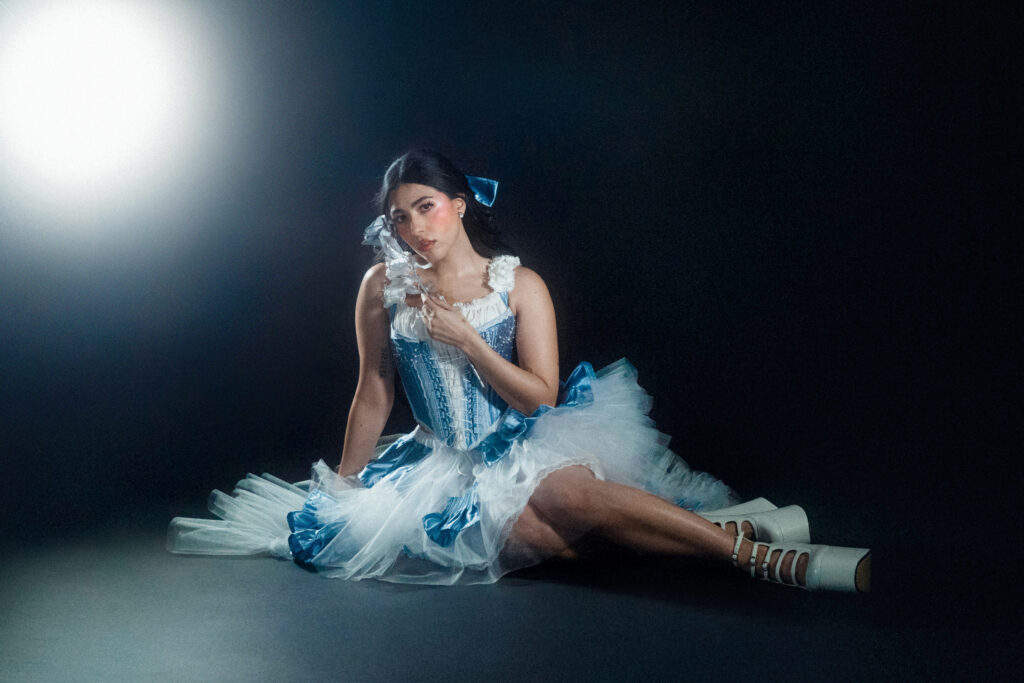Transformation is a funny thing. In seeking self-improvement, we parse through our inner angels and demons, designating our better tendencies as core parts of our identity and dismissing problem areas as reflections of past selves we’re bound to outgrow — as if both sides aren’t integral parts of us. Personal growth can be a tricky and disingenuous prospect — often further muddied by capitalism, armchair psychologists and religious zealots — but it’s also an essential, life-affirming process worth enduring. Box for Buddy, Box for Star, the latest album from This Is Lorelei, explores this conundrum, functioning both as an earnest transformative exercise and a tongue-in-cheek takedown of the illusion of transformation.
Since 2012, New York City singer-songwriter Nate Amos (Water From Your Eyes, My Idea) has recorded and self-released hundreds of songs under the This Is Lorelei moniker, and perhaps surprisingly, after a decade plus, Box for Buddy, Box for Star marks the first attempt at a traditional, intentionally written full-length album. Amos describes the bulk of This Is Lorelei’s discography as “unedited diary entries,” written and recorded without much forethought, regard for genre or reverence for albums as thematic bodies of work, so oddly enough, Box for Buddy, Box for Star is both a fresh start and the culmination of years of diligent, interesting songwriting.
In the summer of 2022, while working on the album, Amos was laser-focused on personal growth and felt an unfamiliar but pressing need to reflect honestly on his life through lyricism. Emotionally, it was a tough period, especially coupled with his mission to write without smoking weed — a substance he relied on nearly every day for the last 15 years — for the first time.
“I had just finished a tour with Water From Your Eyes, during which I laid on the ground at Stonehenge for 40 minutes and decided to stop smoking weed,” Amos explains. “Initially, this album was just a challenge to make music without getting high, and I was worried I wouldn’t come up with anything at all. I isolated myself from pretty much everyone and wrote songs all summer. I was pretty broke and significantly depressed, but also in a sort of healthy mental demolition mode, trying to reimagine how I wanted to move forward with my life. For better or worse, what I made ended up being a delayed recovery album, largely dealing with more significant addictions that I kicked a year earlier.”
Much to his surprise, it was a creatively abundant time, yielding roughly 70 songs. To pull this off, Amos hunkered down in his Brooklyn apartment for three months and followed a peculiar daily routine: eat ramen, smoke cigarettes, do 500 push-ups and 1,500 sit-ups, lift guitars like dumbbells, intermittently watch Texas-Mexico crime drama The Bridge and crucially, write songs. “Whenever I got fidgety because I couldn’t smoke weed, I would just do push-ups,” Amos recalls. “It got to a point where I was like, ‘I’m gonna light this cigarette, and I’m gonna do push-ups until I’ve smoked the entire cigarette, and then I’m gonna try to write another song.'”
Box for Buddy, Box for Star embraces traditional pop songcraft and a confessional, carefully written brand of lyricism, dabbling in the kind of classic singer-songwriter cliches he never imagined toying with — but not without the counterbalancing force of shitpost-y irony, which listeners have come to expect from Amos. Inspired by the gritty romanticism of Shane MacGowan and the Jim Croce mimicry of Tim Heidecker’s What the Brokenhearted Do… , the LP exudes both a grizzled charm and youthful intensity. Sonically, Amos adorns the record with quaint country gestures — a full-circle artistic choice for Amos whose father is a veteran bluegrass musician. “That kind of music is deeply ingrained in me,” Amos says. “I think for that reason, I definitely avoided it for a long time — not because I dislike that music by any means. I’ve always loved country music. But there was something about coming back to that and embracing it that felt vaguely autobiographical.”
And it wouldn’t be a Nate Amos release without a few curveballs, like “Dancing in the Club,” a bouncy auto-tuned pop song, which he likens to Bruce Hornsby-via-Blink-182, or “Perfect Hand,” an intimate piano-led track with vocal samples, alarm bell-like effects and skittering electronic beats. He also mischievously opens the album with a red herring of sorts, “Angel’s Eye,” a twangy sci-fi country duet about an angel who abducts a cowboy and unintentionally falls in love.
In many ways, Box for Buddy, Box for Star, is defined by dualities. Whether it’s angels and demons or god and Satan, Amos uses imagery that pits good and evil against each other to make a larger point about the way we draw clear lines between our past and future selves in order to facilitate self-growth. In doing so, Amos underscores the inextricable link between our past and future and critiques the notion of total, sudden transformation. The album title is also an apt reference to our past and future, with “box for buddy” representing a demon-like figure and a “coffin for the past,” and “box for star” representing an angel-like figure and a “music box for the future.” But what really grounds the album is its earnest, radically candid meditations, or as Amos calls them, “aggressive self-reflections.” On “Where’s Your Love Now,” Amos is strikingly blunt while recounting a friendship ravaged by addiction, and on “Perfect Hand,” he offers a hopeful yet measured view of his life in matter-of-fact terms.
Box for Buddy, Box for Star is a series of balancing acts: past and future, confidence and self-mockery, country and electronic music, self-improvement and accountability, openness and self-preservation. Nate Amos reaches into the depths of his personal hell and emerges with an intensely affecting album that offers listeners space to contemplate their own past, future and conception of transformation. Just bring three boxes: one to bury your shame, one to safeguard your hopes and one to fill with This Is Lorelei’s gorgeous, illuminating and delightfully unfussy songs.
This show is at Schubas

Schubas
3159 N Southport Ave
Chicago, IL 60657
(773) 525-2508

